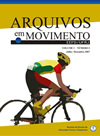INFLUÊNCIA DOS DIFERENTES TIPOS DE AQUECIMENTO NO NÚMERO DE REPETIÇÕES NOS EXERCÍCIOS RESISTIDOS
Palavras-chave:
Aquecimento específico. Flexibilidade. Aeróbico no step. Treinamento resistido. Key -- Words, Specific warm-up. Flexibility. Aerobic step. Resistive training.Resumo
O objetivo deste estudo foi verificar a influência do aquecimento específico (AE), aquecimento de flexibilidade passiva (AFP) e aquecimento aeróbico no step (AAS), no número de repetições nos exercícios resistidos. A amostra foi composta por 15 indivíduos do sexo masculino (25,33 À 3,35 anos; 174 À 6,77 cm; 79,14 À 7,98 kg; 9,88 À 4,26 % Gordura). Cada sujeito realizou cinco visitas, sendo as duas primeiras para o teste e re-teste de 10RM e nas demais foram realizados os protocolos específicos de aquecimento seguidos da sessão de treinamento. O tratamento estatístico (α = 0,05) foi realizado através do teste de Análise de Variância (ANOVA-two way). O Teste Post hoc de Tukey serviu para identificar possíveis diferenças entre as variáveis. No exercício de supino os valores médios na 1ª; 2ª e 3ª séries para AE (9,93 À 0,25; 8,93 À 0,88 e 7,66 À 1,04 repetições), AFP (10; 8,93 À 0,79 e 7,93 À 0,70 repetições) e AAS (10; 8,66 À 1,04 e 7,93 À 0,79 repetições), enquanto no agachamento foram AE (10; 9,73 À 0,59 e 8,86 À 0,91 repetições), AFP (10; 9,86 À 0,35 e 8,86 À 0,63 repetições) e AAS (10; 9,86 À 0,35 e 8,35 À 0,63 repetições). Tais resultados não se configuraram por diferenças estatisticamente significativas. Pode-se sugerir que os tipos de aquecimento não influenciaram no desempenho de exercícios resistidos.
ACUTE INFLUENCE OF THE DIFFERENT KINDS OF WARM-UP ON THE NUMBER REPETITIONS OF RESISTANCE EXERCISES.
Abstract: The purpose of this study was to verify the influence of specific warm-up (EW), passive flexibility warm-up (PFW) and aerobic step warm-up (ASW), on the number of repetitions on the resistance exercises. Fifteen men participate of the study (25.33 À 3.35 years; 174 À 6.77 cm; 79.14 À 7.98 kg; 9.88 À 4.26 % body fat). Each subject performed five visits, being two first visits, it was made test and re-test of ten repetitions maximums (10RM) and the next consisted of the three specific protocols followed by the training session. The statistical treatment (α = 0.05) based on Variance Analysis test (ANOVA-two way). Tukey's post hoc test was used to identify possible differences between variables. On the chest press the average values in the 1st; 2nd and 3rd sets to EW (9.93 À 0.25; 8.93 À 0.88 and 7.66 À 1.04 repetitions), PFW (10; 8.93 À 0.79 and 7.93 À 0.70 repetition) and ASW (10; 8.66 À 1.04 and 7.93 À 0.79 repetitions), on squat EW (10; 9.73 À 0.59 and 8.86 À 0.91 repetitions), PFW (10; 9,86À0,35 and 8,86 À 0,63 repetitions) and ASW (10; 9.86 À 0.35 and 8.35 À 0.63 repetitions). The results there where not difference among warm up. We can conclude that there aren't significant differences in the repetitions number with EW, PFW and PFW.

